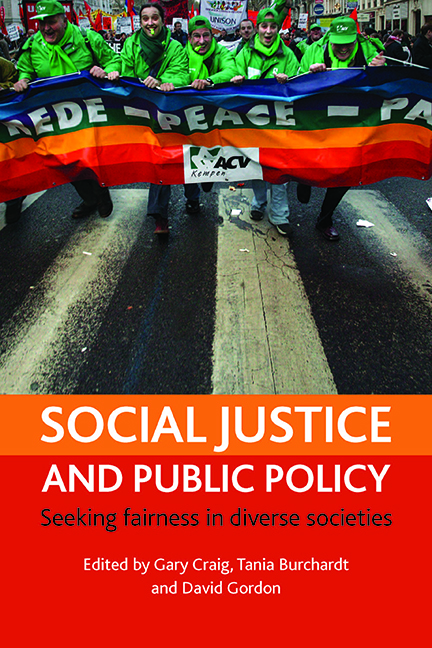Book contents
- Frontmatter
- Dedication
- Contents
- Acknowledgements
- Notes on contributors
- Introduction
- one Social justice and public policy: a view from political philosophy
- two Social justice and public policy: a social policy perspective
- three Multiculturalism, social justice and the welfare state
- four Structural injustice and the politics of difference
- five Recognition and voice: the challenge for social justice
- six Globalisation, social justice and the politics of aid
- seven Social justice and the family
- eight Children, policy and social justice
- nine Social justice in the UK: one route or four?
- ten Monitoring inequality: putting the capability approach to work
- eleven The limits of compromise? Social justice, ‘race’ and multiculturalism
- twelve Understanding environmental justice: making the connection between sustainable development and social justice
eight - Children, policy and social justice
Published online by Cambridge University Press: 19 January 2022
- Frontmatter
- Dedication
- Contents
- Acknowledgements
- Notes on contributors
- Introduction
- one Social justice and public policy: a view from political philosophy
- two Social justice and public policy: a social policy perspective
- three Multiculturalism, social justice and the welfare state
- four Structural injustice and the politics of difference
- five Recognition and voice: the challenge for social justice
- six Globalisation, social justice and the politics of aid
- seven Social justice and the family
- eight Children, policy and social justice
- nine Social justice in the UK: one route or four?
- ten Monitoring inequality: putting the capability approach to work
- eleven The limits of compromise? Social justice, ‘race’ and multiculturalism
- twelve Understanding environmental justice: making the connection between sustainable development and social justice
Summary
Introduction
Children's needs and services are one of the current UK government's foremost policy priorities. In 1999, Tony Blair gave a commitment to end child poverty forever, within a generation. This was, arguably, the most radical and far-reaching policy commitment made by the New Labour governments. More recently, Children's Commissioners have been appointed in every country in the UK and the 2004 Children Act and the Every Child Matters framework (www.everychildmatters. gov.uk) are designed to coordinate services for children at all levels of government. The announcement of the Children's Plan by the new Secretary of State for Children late in 2007 takes this commitment even further.
Internationally, children's rights have received widespread policy support with every member state of the United Nations (UN) (193 countries) signing the UN Convention on the Rights of the Child (UNCRC). By contrast, both the social and the economic/distributional justice literatures effectively ignore children – often relegating them to a mere property of their household or family, seeing their needs as, in effect, identical to those of their families (for example, in anti-poverty strategies). Children's agency is usually absent (but see Craig, 2002) and, where theory does engage with children, it is often as future workers or citizens rather than as actors with justice claims in their own right.
This chapter is primarily concerned with the policy and philosophy of distributional justice in relation to children in the UK. It first examines the political philosophy underlying current government policies for children, particularly anti-poverty and equality policies. The chapter then reviews the very limited political and economic philosophy literature on distributional justice for children before attempting to reach a conclusion. The focus of this chapter is child-centered, examining the justice of relationships between children, and between children and adults. This focus differs from that of Brighouse and Swift in Chapter Seven, which is primarily concerned with the potential tension between social justice and the family as an institution.
In this chapter, the term ‘distributional justice’ is taken to mean justice in the process and outcome of the distribution of economic and social goods (for example, money, wealth, educational services, health services and housing).
- Type
- Chapter
- Information
- Social Justice and Public PolicySeeking Fairness in Diverse Societies, pp. 157 - 180Publisher: Bristol University PressPrint publication year: 2008



